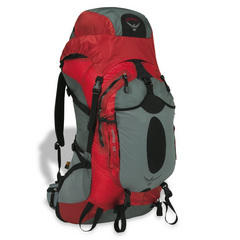Rants and Raves: Osprey in Vietnam

For months I have my eyes set on this lean beauty, even more so now after the Whitney trip during which my Kelty Arrowhead 2500 constantly cut through the flesh in my left shoulder during the 17 hour hike. The problem with the Kelty bag as I finally realized through excruciating pain is that it's shaped like a regular backpack for school with a wider bottom. Although it's got excellent hip belt and sternum belt, the weight sinks to the bottom of the bag. Not to mention the backpack, when empty, weighs a whopping 4 pounds and 5 oz (!!) With the three liter water bladder, well, let's just say I would have been happier to fork over $100 more to spare me from the gnawing pain on my shoulder. This Osprey bag, while roomier with an additional 1300 cu., weighs only 2 pounds and 13 oz. More importantly, when loaded, weight stacks on top of each other instead of sitting at the bottom. Twenty pounds in Arrowhead is still twenty pounds in the Atmos, but it should definitely feel less with its cylindrical shape bearing more resemblance of a long, lean bow on one's back. Too bad, none of the local REI or Adventure 16 carries this in store.
I read an interesting article in the Backpacker magazine about the booming backpack industry in Vietnam. It turns out, Osprey, together with Dana Design, EMS, REI, Ar'teryx, and many others, moved their operations offshore by the end of the 90's to lower production cost. Osprey packs are now co-designed by its founder Mike Pfotenhauer and the 28-year-old émigré named Le Nhu Quynh. The packs are then manufactured in the very factory in which the designs are completed by more young émigrés from the Mekong Delta and other rural areas of Vietnam. According to the author, "There is a lot of Vietnamese creativity going into packs these days, " says Pfotenhauer. Quite ironically, Vietnamese people in general have just about zero appreciation for the adventurous life style many of the westerners embrace when they haul these bags up and down rugged terrain and ice caps. The apparent aversion to the concept of "wilderness" can trace back to the Vietnam War, when Agent Orange was sprayed on much of the forest and numerous landmines were planted, which killed 100,000 people AFTER the war. To camp is to revisit the horror of the memory that during the war, thousands of refugees were forced to live in tents after their own village was bombed and destroyed.
This is one of those things I just have difficulty to come to terms to, to really put it in some kind of explanation and move on. I can see the maturing backpack industry in Vietnam as the scheme to have benefited both the Vietnamese people and save a great brand. Yet it is so obvious that one man's joy can, in another context and experience, be the mountainous sorrow of another.

0 Comments:
Post a Comment
<< Home